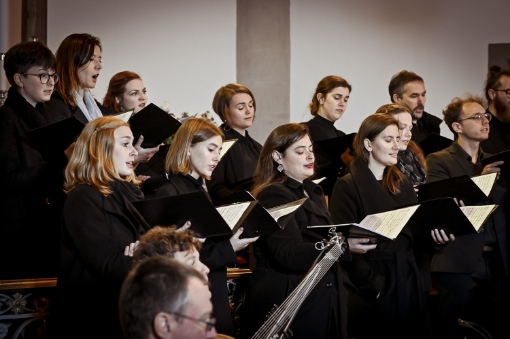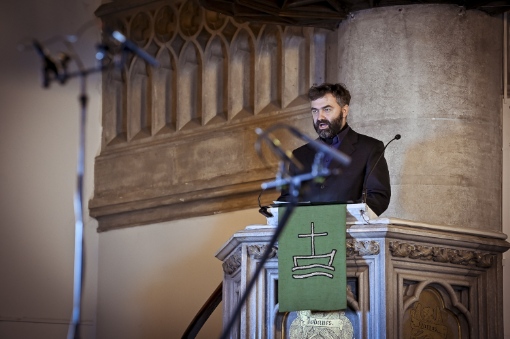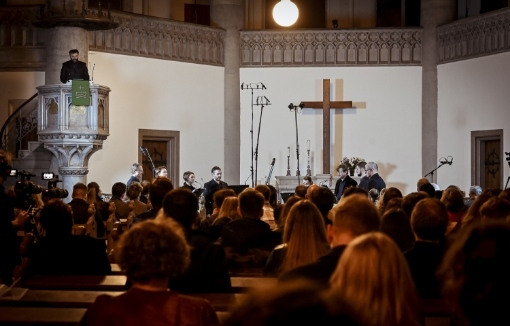The Ensemble Versus choir, accompanied by the Ensemble Opera Diversa under the baton of Gabriela Tardonová, demonstrated what a combination of historical and modern instruments sounds like within a contemporary musical context in the Red Church. The dramaturgical line of Tuesday evening was presented in the spirit of a combination of the works of Carlo Gesualdo da Venosa (1566-1613) and the world premiere of Exsultet by the principal composer Ondřej Kyas (*1979), which also includes parts written for cornett (Radovan Vašina), dulcian (Jan Klimeš), trombone (Pavel Novotný) and theorbo (Marek Kubát).
The extensive cycle of six-voice responsories in Gesualdo’s work holds a truly exceptional status. The responsories are particularly noteworthy for their striking use of contrast (formal and tonal, etc.) and structure – slow and calm passages alternate abruptly with animated sections. Last but not least, they are characterised by numerous madrigalisms (musical illustrations of a single word resembling a sort of artistic exhibition). And all of this in unequivocal adherence to the liturgical text. Responsories for Holy Saturday from 1611 was already reworked in 2022 by Ensemble Versus, or rather its chamber section, for an ensemble performance of the work at the Easter Festival of Sacred Music in Brno. The solo voices in the concert being reviewed here were also wonderfully complemented by a selection of period instruments, these being the cornett, dulcian, theorbo and trombone, which complemented the vocal parts from soprano to bass with their tonal range and unique timbre.

In the first half of the evening, which belonged to the responsories, the audience was also led by the reciting actor and teacher Lukáš Rieger, who delivered the liturgical texts translated into Czech in a calm and firm voice. The vocal ensemble built their performance on dynamic, textural – structural and colourful details. This, for example, made the aforementioned madrigalisms all the more striking. In terms of interpretation, the ensemble played with instrumental variations and chromaticisms, which at times they only subtly hinted at by blending them into a pure musical form, and which at other times they confidently acknowledged, bringing them to the forefront. Last but not least, one could not help but notice the imaginative work with dynamics, which could aptly be described as surprising, in particular thanks to the occasional dynamic leaps, which were, however, absolutely functional and effective given the meaning of the text in question. A prelude in the sense of free improvised phrases before selected parts (e.g. Ecce quomodo moritur Justus, Aestimatus sum and Sepulto Domino) was provided by Marek Kubát playing the theorbo to invoke a certain degree of musical calm and provide a sort of relief from the seriousness of the ceremonial chants. The performance of this selection of Gesualdo’s responsories was not only full of drama – anguish, but also humility, which gave the audience space for their own meditation or prayer.

Ondřej Kyas, the principal composer of Ensemble Opera Diversa, is known to many as the author of full-length mini operas, radio plays and compositions for the orchestral section of the ensemble. Ondřej also performs in the alternative band Květy and as a singer-songwriter under the pseudonym Kygiss. However, he has also composed a number of church/spiritual works (Stabat Mater, Magnificat and Te deum laudamus, to name but a few.), one of which is Exsultet for mixed choir, historical instruments, strings and percussion, the world premiere of which was performed at this concert, with a list of performers resulting from the specifics of the commission. The Easter hymn is divided into 24 stanzas, the textual roots of which go all the way back to the 4th century. All of the musical material (with one exception) was created by the composer himself. After all, as he says in his commentary: “I considered leaving the original choral melody as the basis for my composition, but in the end, I decided to create lines all of my own; the only place where I reference the original chant is in a dialogical passage (priest: “Dominu vocibus”, congregation: “Et cum spiritu tuo”, etc.), which breaks free from the monological nature of the whole Exsultet.” Ondřej Kyas based each of the text sections on a drone selected from a catalogue of his own four-note chords, which he has created as part of his compositional practice and which he regularly returns to. The selected four-note chords have a strong harmonic ambiguity (mainly due to the noticeable modal reasoning) and harbour tensions arising from a slight dissonance. The musical and compositional experience of the composer cannot be denied, a fact which is especially evident in his imaginative and inventive work. We were able in particular to hear this in the melodic lines of the choir, which was for the most part monophonic, though not dull. Following the interpretive practice of the time, he played with range and contrasts – male vs. female voices, high vs. low, which were also supported by the accompanying instruments. However, the composer supported the dramatically tense sections with multiple voices based on parallel intervals reminiscent in sound of the work of medieval choralists. A great challenge here for Ondřej Kyas was to incorporate a set of historical instruments in a tasteful and imaginative way, the end result of which was a resounding success. The composer left enough space for these instruments in the composition. Worth mentioning here is the instrumental interlude oriental (eastern) in nature, which was also interesting from the point of view of the embellishments used. The blending of old and new elements, sounds and instruments, etc. was accomplished seamlessly in the spirit of naturalness, taste and simplicity, meaning that the period instruments were able to maintain a discreet yet audible presence. The choir also deserves praise, having to contend with entrances and jumps which were not very natural in many places. Despite all the pitfalls, the choral performance sounded refined, understated and colourful. Highlighting the parts for female voices only is an absolute must, but also the sections written for the male component of Ensemble Versus (e.g. the verse Oramus te, Domine), which sounded almost mystical. My only reservation, the cause of which is however determined by the acoustics of the venue, is the clarity of the text. The important role of Martin Švec playing vibraphone and bongos must also be emphasised. The vibraphone parts were reminiscent of bells (or wind chimes) with their minimalist features and they assumed not only a colourful but primarily symbolic function in the composition.
With the material it showcased, the concert represented a bridge between two musical worlds – seemingly contradictory. It presented the beauty of early music and the associated interpretation practices of the time. Above all however, it showed the audience that this world too can serve as a deep well of compositional approaches, forms and other types of inspiration for the contemporary composers of today.
Programme:
Carlo Gesualdo da Venosa – Responsories for Holy Saturday (selection)
Ondřej Kyas – Exsultet for choir, historical instruments, strings and orchestra (premiere)
Ensemble Versus – Choirmasters Vladimír Maňas and Patrik Buchta
Ensemble Opera Diversa – Concertmaster Jan Bělohlávek
Gabriela Tardonová – Conductor
Martin Švec – Percussion
Radovan Vašina – Cornett
Jan Klimeš – Dulcian
Pavel Novotný – Trombone
Marek Kubát – Theorbo
Lukáš Rieger – Spoken word
Tuesday, 24 October 2023 at 7:00 pm, Red Church

































No comment added yet..